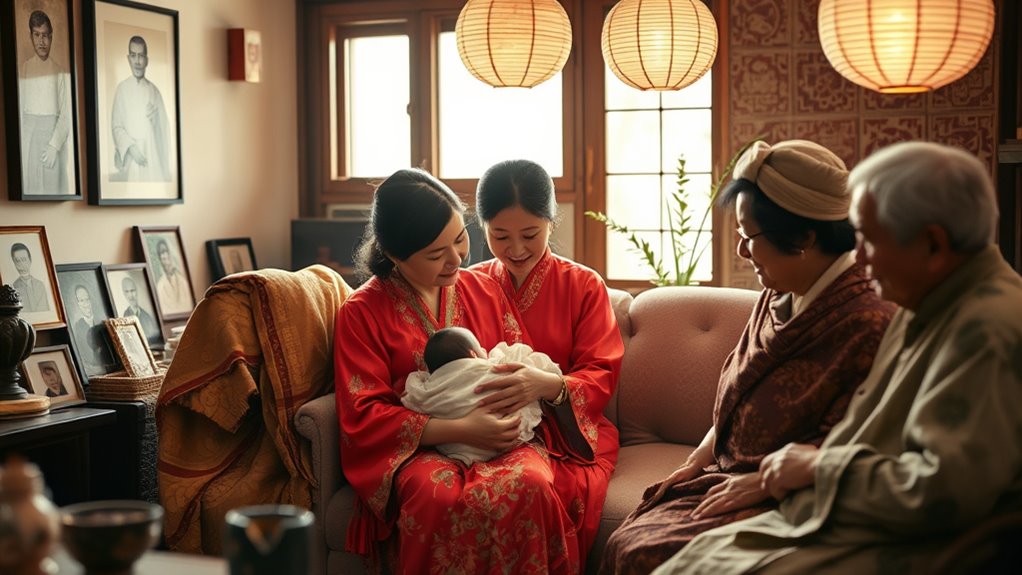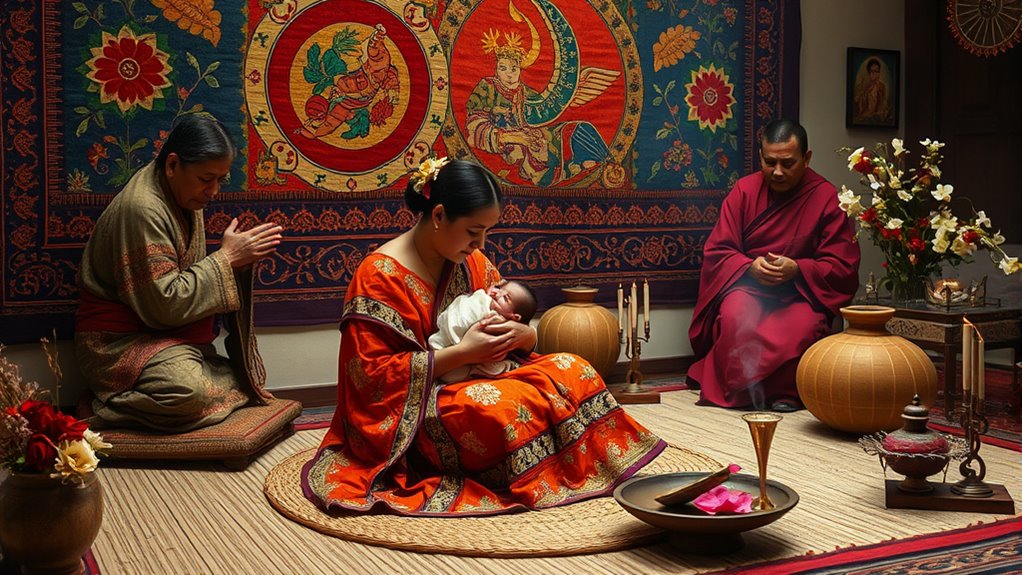Cultural traditions play a big role in how you cope with postpartum mental health. They shape support systems through community involvement, rituals, and shared responsibilities that help you feel connected and cared for. These practices provide emotional reassurance, reduce feelings of isolation, and promote resilience. Rituals and ceremonies honor your experience, giving you a sense of security. Exploring these cultural influences can offer valuable insights into nurturing your mental well-being during the postpartum period.
Key Takeaways
- Cultural traditions provide structured rituals and community support that foster emotional resilience in new mothers.
- Collective caregiving reduces feelings of isolation and offers practical and emotional assistance postpartum.
- Rituals and ceremonies validate the mother’s experience, promoting a sense of security and cultural identity.
- Respecting and integrating cultural practices into healthcare enhances trust and improves mental health outcomes.
- Community involvement and shared responsibilities help buffer postpartum depression and anxiety across diverse cultures.

Postpartum mental health is a universal concern, yet how societies understand and address it varies widely across cultures. In many traditions, postpartum practices are deeply rooted in cultural beliefs that influence how new mothers cope with the emotional and physical challenges of motherhood. These traditional practices often serve as a framework for supporting women during this vulnerable time, emphasizing community involvement and shared responsibilities. Instead of relying solely on medical interventions, many cultures lean on age-old rituals that foster a sense of belonging and reassurance. For example, some communities observe a “lying-in” period, where new mothers rest extensively, supported by family and community members who help with daily chores and child-rearing. This approach not only promotes physical recovery but also creates a protective environment that can buffer against postpartum depression and anxiety.
Community support is integral to many cultural practices surrounding postpartum care. When you’re guiding the emotional highs and lows of new motherhood, knowing that your community stands behind you can be incredibly comforting. In traditional societies, this support often manifests through collective caregiving, where relatives and neighbors pitch in to care for both the mother and the baby. Such involvement helps reduce feelings of isolation, which are common in postpartum mental health struggles. It also reinforces cultural values of interdependence and shared responsibility, making it easier for women to open up about their feelings without shame or stigma. This communal approach can be especially imperative in areas where mental health resources are limited or where seeking psychological help is stigmatized.
These practices also serve as a form of informal mental health care. When community members check on new mothers regularly, they provide emotional reassurance and practical assistance, reducing the likelihood of postpartum issues escalating unnoticed. In some cultures, special rituals or ceremonies are performed to honor the new mother, signaling her importance and offering spiritual or emotional support. This collective participation promotes a sense of security and connectedness, which can be indispensable for emotional resilience. Additionally, understanding the cultural beliefs surrounding postpartum care can help health professionals develop more effective and respectful support systems. By integrating traditional practices with community involvement, societies create a supportive environment that acknowledges postpartum mental health as a fundamental part of overall well-being. Recognizing and respecting these cultural approaches can help health professionals develop more culturally sensitive support systems, ensuring that new mothers feel understood and cared for within their cultural context.
Frequently Asked Questions
How Do Cultural Beliefs Influence Postpartum Support Systems?
Your cultural beliefs shape postpartum support systems through cultural healing practices and strong community involvement. These traditions often emphasize family support, rituals, and collective care, helping you feel connected and reassured. By participating in cultural healing activities and relying on community networks, you gain emotional comfort and practical assistance. This cultural framework fosters resilience, ensuring you’re supported physically, emotionally, and spiritually during your postpartum journey.
Are There Traditional Postpartum Rituals That Impact Mental Health?
You might find that traditional healing rituals deeply impact your mental health during postpartum. These rituals, often carrying significant ritual importance, can provide emotional support, foster community bonds, and give you a sense of control. Yet, they also might carry unspoken pressures or expectations. The power of these practices lies in their ability to connect you to cultural roots, offering comfort and resilience in times of vulnerability.
How Do Family Roles Vary Across Cultures in Postpartum Care?
You’ll find that family roles vary widely across cultures in postpartum care. In some societies, an extended family plays a crucial role, with elders guiding new mothers and sharing responsibilities. Gender roles often influence who provides support; in many cultures, women primarily care for the baby and household, while men may focus on financial support. These cultural differences shape how postpartum support is structured and experienced.
What Are Common Stigmas Surrounding Postpartum Mental Health Globally?
You might notice that mental health stigma and societal shame often surround postpartum mental health in many cultures. People may fear being judged or misunderstood, leading new mothers to hide their struggles. This stigma can prevent women from seeking help, worsening their condition. Recognizing these barriers is essential to fostering understanding and support, so you can encourage open conversations and reduce societal shame around postpartum mental health issues.
How Do Cultural Perceptions Affect Seeking Professional Help?
Imagine you’re steering through a maze where stigma barriers act like tall walls blocking your path. Cultural perceptions shape your help seeking attitudes, making you hesitant to reach out for professional support. These traditions can either be guiding stars or obstacles, influencing your comfort and trust in mental health services. When stigma barriers are strong, you might feel shame or fear, making it harder to seek the help you need to find your way out.
Conclusion
Understanding how different cultures approach postpartum mental health shows you that coping strategies are deeply rooted in tradition. These customs can offer comfort and community, but they may also present challenges if they conflict with modern mental health practices. Isn’t it essential to respect cultural differences while ensuring new mothers get the support they need? By bridging tradition and contemporary care, you can help create a more inclusive approach that honors every woman’s unique journey.









